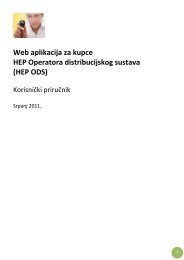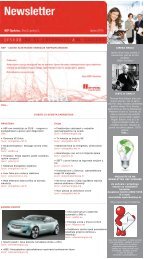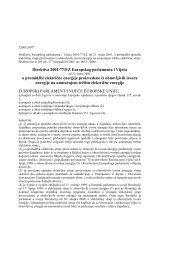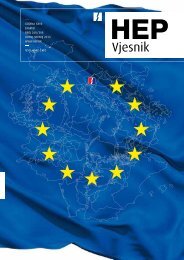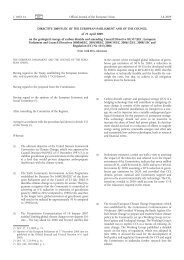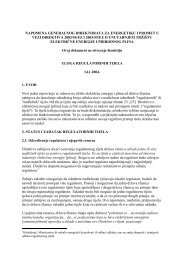Create successful ePaper yourself
Turn your PDF publications into a flip-book with our unique Google optimized e-Paper software.
trend razvoja preferencija druπtvene zajednice,<br />
kao i dugoroËnu neodræivost danaπnjih tehnoloπkih<br />
smjernica u elektroenergetici pa oblikuju politiku<br />
potpore ËiπÊim tehnologijama, sve u cilju bræeg<br />
tehnoloπkog sazrijevanja obnovljivih izvora energije,<br />
πto zatim donosi smanjenje troπkova i πiru<br />
rasprostranjenost, poglavito u sprezi s postojeÊom<br />
elektrodistribucijskom mreæom. Ove strategije<br />
potpore, pored prodora na domaÊa træiπta, ciljaju<br />
i na veÊu nazoËnost na inozemnim træiπtima koja<br />
pokazuju sve veÊe zanimanje za vodeÊa poduzeÊa<br />
u pojedinim tehnologijama.<br />
Efekti programa potpore obnovljivim izvorima<br />
energije i sliËno trebaju se, dakle, ocjenjivati<br />
na temelju mnogih elemenata koji doprinose<br />
definiranju onoga πto je u nekim dokumentima<br />
energetske politike nazvano viπestrukom dividendom<br />
investicije u obnovljive izvore energije.<br />
Podupiranje poduzeÊa iz ovoga sektora na nacionalnoj<br />
razini moæe biti vaæan strateπki odabir u<br />
svjetlu moguÊe afirmacije na svjetskome træiπtu,<br />
primjerice, stabilna politika potpore proizvodnji<br />
elektriËne energije u elektranama na vjetar koju<br />
provodi vlada Republike Danske dovela je do<br />
toga da danas u toj zemlji elektriËna energija<br />
proizvedena vjetroelektranama predstavlja treÊu<br />
stavku u ukupnom izvozu te zemlje.<br />
U konaËnici, tijekom 90-tih godina mnogi obnovljivi<br />
izvori energije su odavno proπli svoju<br />
eksperimentalnu fazu i postali znaËajan Ëimbenik<br />
u proizvodnji Ëiste elektriËne energije, a u nekim<br />
sluËajevima i sasvim solidan realitet. Ipak, u nekim<br />
drugim sluËajevima stupanj tehnoloπke zrelosti joπ<br />
je uvijek nizak i krivulja usvajanja na temelju koje<br />
bi se moglo oËekivati znatnije smanjenje troπkova<br />
joπ je uvijek velikim dijelom neπto πto joπ treba<br />
svladati. Na temelju ovih elemenata zasniva<br />
se argumentacija koja govori u prilog programa<br />
potpore diferenciranog prema stupnju razvoja<br />
svakog pojedinog izvora ili tehnoloπkog rjeπenja.<br />
3.3 Diversifikacija izvora, sigurnost opskrbe i<br />
utjecaj na zaposlenost<br />
TreÊi razlog zbog kojeg je poæeljno podræavanje<br />
obnovljivih izvora energije povezuje se s<br />
klasiËnim ciljem energetske politike: dugoroËno<br />
zajamËiti sigurnost opskrbe. UnatoË smanjenim<br />
preokupacijama kad je rijeË o nedostatnim isporukama<br />
energije do kojih moæe doÊi kako zbog<br />
fiziËkih razloga tako i zbog politiËkog embarga,<br />
odnosno teroristiËkog djelovanja, i dalje opstoji<br />
kolektivni interes da se dugoroËno uzme u obzir<br />
i moguÊnost nastanka krizne situacije. Drugim<br />
rijeËima, iako kvantificiranje nije nimalo lako,<br />
druπtvena zajednica spremna je platiti za sigurnost<br />
πto træiπte ne uvaæava zbog free rider mentaliteta.<br />
The White Paper of the EU as well as other programs<br />
that introduce special regimes for these sources at<br />
the national level (NFFO in England, Regimen especial<br />
in Spain, Stromeinspeisungsetz in Germany,<br />
program Eole 2005 in France etc.), show that political<br />
representatives at the national and supranational<br />
levels are definitely taking into account this trend in<br />
public opinion, as well as the long-term unsustainability<br />
of today’s technological directions in electrical<br />
energy and therefore shape a policy of support for<br />
clean technologies, all with the goal of accelerating<br />
technological maturity of renewable energy sources,<br />
thereby achieving lower costs and broader distribution,<br />
especially in connection with the existing<br />
electricity distribution network.These strategies of<br />
support, in addition to penetration on the domestic<br />
markets, are also aimed at greater presence on the<br />
foreign markets, which are displaying increasing<br />
interest in the leading enterprises for individual<br />
technologies.<br />
The effects of programs of support for renewable energy<br />
sources and the like should, therefore, be evaluated<br />
on the basis of many elements that contribute to defining<br />
that which in some documents of energy policy<br />
is called multiple dividends from investment in renewable<br />
energy sources. Support for enterprises from<br />
this sector at the national level may be an important<br />
strategic choice in the light of possible affirmation<br />
on the world market. For example, due to the stable<br />
policy of support for wind energy power generation<br />
implemented by the government of the Republic of<br />
Denmark, electricity generated by wind power plants<br />
is the third largest Danish export today.<br />
By the 1990s, many renewable energy sources had<br />
long since passed their experimental phase, become<br />
a significant factor in the production of clean electrical<br />
energy and in some cases were already a reality.<br />
Nonetheless, in some other cases the degree of<br />
technological maturity is still low and the acceptance<br />
curve, on the basis of which significant reductions in<br />
costs could be anticipated, requires further efforts.<br />
Based on these elements, it is argued that a program<br />
of support should be differentiated according to the<br />
level of the development of each individual source or<br />
technological solution.<br />
3.3 Diversification of sources, security of supply and<br />
effect on employment<br />
The third reason that it is desirable to support renewable<br />
energy sources is connected with the classic<br />
goal of energy policy: the long-term guarantee for the<br />
security of supply. Despite reduced preoccupations<br />
concerning insufficient deliveries of energy that can<br />
occur due to physical causes or political embargo,<br />
i.e. terrorist activity, there is still long-term collective<br />
interest, taking into account the possibility of a crisis<br />
De Paoli, L., ViπkoviÊ, A., Javna potpora razvitku obnovljivih..., Energija, god. 56(2007), br. 3., str. 328∑345<br />
De Paoli, L., ViπkoviÊ, A., Public support for the development..., Energija, vol. 56(2007), No. 3, pp. 328∑345<br />
336



